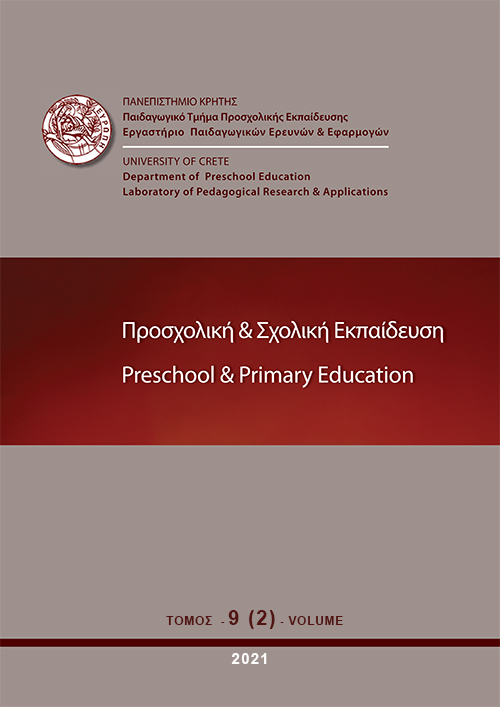Διερεύνηση της εμπλοκής των γονέων σε σχέση με τον γραμματισμό των παιδιών προσχολικής ηλικίας στη βάση του μοντέλου των επικαλυπτόμενων σφαιρών επιρροής της Epstein

Περίληψη
Περίληψη. Παρά το έντονο ενδιαφέρον για τη συμβολή της γονικής συμμετοχής στη γενικότερη μαθησιακή εξέλιξη των παιδιών αλλά και ειδικότερα στην κατάκτηση του γραμματισμού, είναι αρκετά περιορισμένη η γνώση μας αναφορικά με τα ποσοτικά και ποιοτικά χαρακτηριστικά της εμπλοκής για τον γραμματισμό των γονέων παιδιών προσχολικής ηλικίας. Η συγκεκριμένη περίοδος είναι εξαιρετικά σημαντική για τη γλωσσική ανάπτυξη των παιδιών. Eπιπρόσθετα, η εισαγωγή των παιδιών στην επίσημη εκπαίδευση μπορεί να λειτουργήσει αντισταθμιστικά στις εμπειρίες γραμματισμού, ενισχύοντας μεταξύ άλλων τον γονικό ρόλο μέσα από τη συνεργασία σχολείου-οικογένειας. Σκοπός της έρευνας αυτής είναι να μελετήσει τις πρακτικές γονικής εμπλοκής για τον γραμματισμό παιδιών νηπιαγωγείου, αξιοποιώντας το μοντέλο που προτείνει η Epstein για την ενίσχυση της γονικής εμπλοκής από τους εκπαιδευτικούς, προσαρμόζοντάς το κατάλληλα για το νηπιαγωγείο και σε σχέση με τα ζητήματα γραμματισμού. Στη βάση αυτή, αναπτύχθηκε ερευνητικό εργαλείο (ερωτηματολόγιο), το οποίο αποτελεί μέρος μιας ευρύτερης μελέτης για την ανάπτυξη του γραμματισμού στην προσχολική ηλικία. Στην έρευνα συμμετείχαν 214 γονείς παιδιών νηπιαγωγείου από όλες τις περιφέρειες της χώρας μας. Στη συζήτηση αναδεικνύονται οι πρακτικές γραμματισμού στις οποίες εμπλέκονται περισσότερο και λιγότερο οι γονείς καθώς και η σχέση δημογραφικών χαρακτηριστικών με αυτές.
Summary. Despite the strong interest in the contribution of parental involvement in children’s learning and in particular in the acquisition of literacy, our knowledge regarding the quantitative and qualitative characteristics of literacy involvement of parents of preschool children is quite limited. This period is extremely important for the language development of children. In addition, the introduction of children in formal education can compensate for poor literacy experiences, strengthening, among other things, the parental role through school-family cooperation. The purpose of this research is to study the practices of parental involvement regarding the promotion of their kindergarten children’s literacy skills, using the model proposed by Epstein and adapting it appropriately for kindergarten and in relation to literacy issues. Particularly the present study seeks to highlight the type, frequency and quality of parental involvement when children attend kindergarten, in order to form a knowledge base for the design of interventions related to the strengthening of school-family-community collaboration in relation to literacy issues. On this basis, a research tool (questionnaire) was developed, which is part of a broader research design concerning the promotion of literacy in the kindergarten. The relation between specific parental literacy practices and their relationship with their children with specific demographic characteristics (child age, parent gender, urbanity, level of education) was also investigated. The research involved 214 parents of kindergarten children from all regions in Greece. The discussion highlights the literacy practices in which parents are more and less involved and the role of certain demographic characteristics.
In a general view we would say that the results of the research are quite encouraging as far as the willingness of the parents to engage in literacy activities with their children is concerned. Parents seem to recognize the importance of their involvement in promoting literacy since they are involved in this process in several ways. However, they do not seem to sufficiently recognize the need for organized and effective collabsoration among the three systems, school-family- community, as their practices are substantially limited within the family context. In terms of demographic characteristics, parent gender and level of education were found as factors related to parental involvement practices, while urbanity and the child's age did not appear to influence parental literacy practices.
The questionnaire developed seemed to meet the required validity and reliability criteria. It could be used by educators and other professionals in the field of preschool education in order to study parental involvement in promoting young children's literacy. In any case, both the psychometric robustness of the questionnaire and the parental involvement for literacy should be further investigated taking into account the perspective of teachers and utilizing multimodal approaches.
Λεπτομέρειες άρθρου
- Πώς να δημιουργήσετε Αναφορές
-
Πεντέρη Ε., & Παπαναστασάτου Ε. (2021). Διερεύνηση της εμπλοκής των γονέων σε σχέση με τον γραμματισμό των παιδιών προσχολικής ηλικίας στη βάση του μοντέλου των επικαλυπτόμενων σφαιρών επιρροής της Epstein. Preschool and Primary Education, 9(2). https://doi.org/10.12681/ppej.25791
- Τεύχος
- Τόμ. 9, Αρ. 2 (2021)
- Ενότητα
- Άρθρα

Αυτή η εργασία είναι αδειοδοτημένη υπό το CC Αναφορά Δημιουργού – Μη Εμπορική Χρήση – Παρόμοια Διανομή 4.0.
Οι συγγραφείς των άρθρων που δημοσιεύονται στο ΠΡΟΣΧΟΛΙΚΗ & ΣΧΟΛΙΚΗ ΕΚΠΑΙΔΕΥΣΗ διατηρούν τα δικαιώματα πνευματικής ιδιοκτησίας επί των άρθρων τους, δίνοντας στο περιοδικό το δικαίωμα της πρώτης δημοσίευσης. Άρθρα που δημοσιεύονται στο ΠΡΟΣΧΟΛΙΚΗ & ΣΧΟΛΙΚΗ ΕΚΠΑΙΔΕΥΣΗ διατίθενται με άδεια Creative Commons 3.0 και σύμφωνα με την άδεια μπορούν να χρησιμοποιούνται ελεύθερα, με αναφορά στο/στη συγγραφέα και στην πρώτη δημοσίευση για μη κερδοσκοπικούς σκοπούς και με δικαίωμα τροποποίησης μόνον με παρόμοια διανομή (αν αναμείξετε, τροποποιήσετε, ή δημιουργήσετε πάνω στο υλικό, πρέπει να διανείμετε τις δικές σας συνεισφορές υπό την ίδια άδεια όπως και το πρωτότυπο). To Εργαστήριο Παιδαγωγικών Ερευνών και Εφαρμογών του Παιδαγωγικού Τμήματος Προσχολικής Εκπαίδευσης του Πανεπιστημίου Κρήτης και το Εθνικό Κέντρο Τεκμηρίωσης διατηρούν το δικαίωμα να δημοσιεύουν, να αναπαραγάγουν, να παρουσιάζουν στο κοινό, να διανέμουν και χρησιμοποιούν άρθρα που δημοσιεύονται στο ΠΡΟΣΧΟΛΙΚΗ & ΣΧΟΛΙΚΗ ΕΚΠΑΙΔΕΥΣΗ σε οποιοδήποτε μέσο και μορφή είτε μεμονωμένα είτε ως μέρη συλλογικών έργων, για όλο το χρόνο διάρκειας προστασίας της πνευματικής ιδιοκτησίας και για όλες τις χώρες του κόσμου. Αυτό περιλαμβάνει ενδεικτικά και όχι αποκλειστικά, το δικαίωμα δημοσίευσης των άρθρων σε τεύχη του περιοδικού ΠΡΟΣΧΟΛΙΚΗ & ΣΧΟΛΙΚΗ ΕΚΠΑΙΔΕΥΣΗ, αναπαραγωγής και διανομής μεμονωμένων αντιγράφων των άρθρων, αναπαραγωγής ολόκληρων των άρθρων σε άλλη έκδοση του Εργαστηρίου Παιδαγωγικών Ερευνών και Εφαρμογών του Παιδαγωγικού Τμήματος Προσχολικής Εκπαίδευσης του Πανεπιστημίου Κρήτης και του Εθνικού Κέντρου Τεκμηρίωσης και αναπαραγωγής και διανομής των άρθρων ή περίληψης αυτών με χρήση πληροφορικού συστήματος αποθετηρίου.


